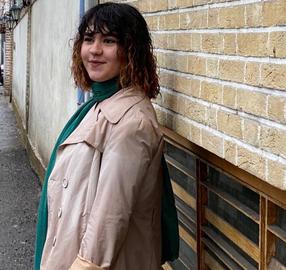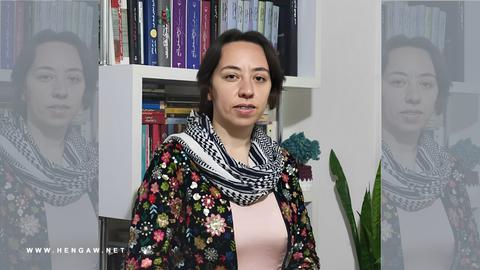Although she fought hard for women’s rights, especially their right to vote, history remembers the name of Farangis Yeganegi (Shahrokh) for her campaign to protect and promote traditional Persian arts and handicrafts. It is for good reason that she is known as the mother of Iranian national handicrafts.
Farangis Yeganegi was born into a cultured and politically active family. Her father was Arbab Kaykhosro Shahrokh, a liberal constitutionalist and influential MP who held a seat in the Iranian parliament for 10 terms.
The Iranian Constitutional Revolution (1905-1911), which led to the establishment of a parliament in the country, took place when Arbab Kaykhosro was 30 years old. He successfully stood for election ahead of its second term, representing the Iranian Zoroastrian community and, in the fourth term, was one of the MPs who opposed the 1919 Anglo-Persian Agreement which gave the British guaranteed access to all Iranian oil fields. Arbab Kaykhosro is also recognized as the founder of the Library of the Parliament of Iran.
Farangis was born on May 11, 1916, when her father took over the presidency of the Iranian Telephone Company. She grew up steeped in her father’s cultural and political activities, completing her primary education up to the ninth grade at Iraj School, which belonged to the Zoroastrian community, and later received her diploma from the American Girls' College. After graduating from Tehran University with a BA in literature, she traveled to the United States to pursue an MA in Social Work.
Upon returning home she married Ardeshir Yeganegi, a cultural and economic activist. Just a few years later, Arbab Kaykhosro Shahrokh was killed in a suspicious car accident in Tehran.
Ardeshir Yeganegi was about 16 years older than Farangis and had established Iran’s first modern leather factory in the city of Hamedan. After their marriage, he established Iran’s first hydraulic power plant in Hamedan in 1936. The main shareholders of this company, named Alvand Electricity, were the people of Hamedan themselves. He went on to create the first ice-cream factory in Iran, purchasing modern refrigerators and other necessary equipment from Russia. After World War Two, he spearheaded reconstruction efforts in the two main streets of Hamedan, Ibn Sina and Abbas Abad.
Farangis and Ardeshir began their marital life in Tehran. They had three children, Parviz, Firuzeh and Kambiz, but both remained active in the cultural and commercial arenas. Despite her husband’s dazzling career, it would be Farangis in the end who achieved the most in both.
Empowerment of Women
While Farangis Yeganegi’s children were still young, she dedicated most of her time to them but still found the time to write a book, Searching the Truths. During the same period she joined the nascent Iranian women’s equality movement and took steps to support girls who were seeking an education. The foundation of the Zoroastrian Women’s Society, a progressive organization that campaigned for women's rights, was one of her most significant early achievements.
In January 1953, Yeganegi’s husband suddenly passed away in Nice, France. Out of the ashes of the tragedy, Yeganegi decided to devote the rest of her life to women’s empowerment. She focused much of her efforts throughout the 1950s on — and brought about — improvements to women's prisons in Iran, and the training of social workers to help women classed as “delinquent” by Iranian society.
Farangis' relentless efforts in the sphere of women's rights would see her take on a prominent role in the High Council of Iranian Women, an umbrella body tasked by Princess Ashraf Pahlavi in 1959 with coordinating the activities of the hundreds of disparate women’s movements in Iran. Its charter was penned by several of its members along with former Prime Minister Ahmad Matin Daftari, and approved at a meeting in the presence of Ashraf Pahlavi, royalist politician Manuchehr Eqbal, and former Prime Minister Asadollah Alam. The Council was later disbanded due to inefficiencies but not before it had succeeded in campaigning for Iranian women’s right to vote, a goal which was achieved in 1963, and established the Iranian Women’s Organization (IWO), a 5,000-member assembly of women from diverse backgrounds and regions in which Yeganegi served as secretary-general.
Preserving and Promoting Cultural Heritage
While advancing myriad causes in the field of women’s rights in the early 1960s, Yeganegi also devoted much of her time to handicrafts, with the fervent intention to help preserve and promote the country’s unique artistic heritage. On a six-month expedition, Yeganegi traveled the length and breadth of Iran, collecting samples of traditional Persian handicrafts from villages and towns along the way. The haul she brought back — including saddlebags, handmade bags, embroidered sheepskin coats, ceramics, glasswork, Tabriz and Baluch batik, as well as needlework — was displayed at a high-profile exhibition held in 1963 at the Wakayama Castle Museum in Japan. It also created the favorable conditions Yeganegi needed to establish in 1966 the Iranian Handicrafts Organization, together with an affiliated commercial center.
Following in her father’s footsteps, Yeganegi was also active in Iran’s literary sphere. In 1958 she established the Ardeshir Yeganegi Library in Tehran in her husband’s memory and at her own expense. It was built on a parcel of land belonging to the Tehran Zoroastrian Association and was initially also home to the Cultural Society of Ancient Iran as well. The Ardeshir Yeganegi Library today houses some 14,000 volumes and is considered a specialist reference center for scholars of the Zoroastrian faith. Numerous well-known Iranian and Western scholars alike have visited the library and included it in their book dedications. Parts of its corpus are extremely valuable because of their content and age.
After the 1979 Islamic Revolution, Yeganegi moved to the United States and became a co-founder and chairwoman of the California Zoroastrian Center. In 1994 she was selected as the Woman of Excellence of the Year and praised at a ceremony held in the University of California, Los Angeles, for the extraordinary breadth and scale of her lifetime accomplishments. Two years later, she received a commendation from the Federation of Zoroastrian Associations of America for her service to the community.
This determined, progressive woman passed away in Los Angeles on February 13, 2010, at the age of 93. She had remained active in her support for women’s causes and in advancing Persian culture until a few months before her death.
visit the accountability section
In this section of Iran Wire, you can contact the officials and launch your campaign for various problems

























comments